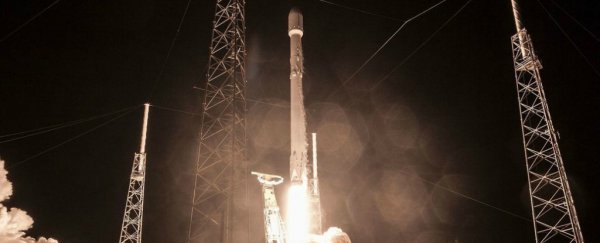NASA's newest satellite is scheduled to launch on the evening of Wednesday 18 April, 22:51 UTC.
Known as TESS, the Transiting Exoplanet Survey Satellite will play a crucial role in humanity's search for planets outside our own Solar System. And it'll be blasted into orbit by SpaceX's famous, reusable Falcon 9 rocket.
Shortly after the launch, SpaceX will attempt to land the rocket's first stage on a robotic ship in the Atlantic Ocean.
Launch coverage begins at 22:30 UTC (18:30 ET).
You can watch it all via the NASA livestream below:

This launch is a big deal because TESS is a very important part of NASA's future space exploration plans.
TESS is the successor to NASA's much-loved Kepler space telescope, which has found almost two-thirds of the more than 3,700 exoplanets we currently know about.
TESS will use the same process to spot planets outside our Solar System - staring at stars and watching for the tiny dips in their brightness that indicate a planet is orbiting in front of them.
But while Kepler could only look at a small patch of the night sky at one time, TESS will be able to cover 24-degree segments of the sky at once - which means it would be able to hunt for alien planets in 85 percent of the visible night sky.
Not only will it be capable of hunting down any exoplanets, TESS has the important role of looking for rocky planets that orbit relatively close to their Sun, similar to Earth.
NASA will then follow up with the US$8.8 billion James Webb Space Telescope to determine whether or not these planets could be habitable.
That means a planet that could potentially harbour alien life - or that it might one day be able to support humanity on our adventures off Earth.
NASA estimates that TESS could find thousands of these candidate planets. If all goes to plan, the satellite will settle into a long, looping orbit around Earth in June.
Not only is it an important first step in helping humanity find a potential new home, it will also be a great test for SpaceX.
The agency wants to land the rocket's reusable first stage after the launch, but also hopes to recover the protective nose cone surrounding TESS during launch from the ocean.
Eventually SpaceX CEO and founder Elon Musk hopes to have rockets that are fully reusable to slash the cost of launching humanity into the Solar System and beyond.
Fingers crossed for a safe and speedy launch. We'll keep you updated on any delays as we get more information.
